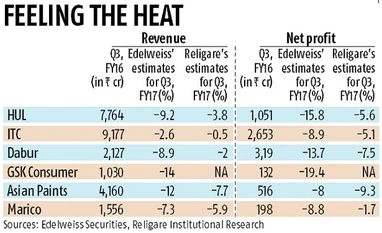Revenue of major fast moving consumer goods (FMCG) companies is estimated to fall by six per cent in the December quarter over a year before, due to demonetisation.
With lack of liquidity leading to lower offtake, they could see a double-digit decline in volume sales during the three months, analysts said.
The impact would also be at their bottom lines, as analysts estimate net profit would fall by 9.8 per cent for major companies. Apart from lower sales, rising commodity prices and postponement of price increases have taken a toll on their profitability in the quarter.
Lower advertisement and promotional (A&P) expenses might offset some of the adverse impact.
Edelweiss Securities estimates the revenue of Hindustan Unilever (HUL), the largest entity, could fall by 9.2 per cent from a year before, compared to 2.7 per cent growth in the same quarter last year. Volume sales are estimated to decline by a high single digit. Dabur India could see a nine per cent dip in revenue. HDFC Securities estimates Dabur's domestic volume sales might shrink by eight per cent, despite a fall of 2.5 per cent in the same quarter last year. GSK Consumer Healthcare's top line is estimated to go down by 14 per cent.
The net profit of GSK Consumer, HUL and Dabur could be hit far more. Analysts estimate a decline of 19.4 per cent, 15.8 per cent and 13.7 per centy, respectively.
Paints and coating majors Asian Paints' and Berger Paints' revenues are estimated to plunge by 12 per cent and 13.4 per cent, respectively, as their volumes could have dipped by up to nine per cent each. Their volumes grew 9.6 per cent and 10 per cent, respectively, in the comparable quarter.
Conglomerate ITC's revenuee could be hit less than peers due to an increase in cigarette prices during the quarter. Analysts estimate its revenue to dip by 0.5 percentage points, to 2.6 per cent. The impact on Nestle will be lower due to a lower base.
Analysts said September and October sales were picking up in a sector that was grappling to maintain healthy volume growth. Sale of FMCG items had been hit hard since the demonetisation of 500- and 1,000-rupee currency notes too effect from November 9. Retailers were estimated to have lost sales by 30-60 per cent, depending on the type of goods they sell. Lower sales at the retail level led to poor recovery of money invested by them, distributors and wholesalers.
Apart from loss of sales, the price of key commodities used as raw material for FMCG items have hit profits. During the quarter, prices of palm oil, sugar and wheat jumped 37 per cent, 35 per cent and 21 per cent, respectively, from a year before. However, no major price increases could be effected, due to subdued consumer sentiment. The extent of these factors has been offset by cuts in A&P spending by various companies, of 10 per cent.
As sales in rural markets have been impacted more than in urban areas, analysts predict companies with higher dependence on urban markets could see less impact. According to Religare Securities, apart from the after-effect of demonetisation, implementation of the goods & services tax could put further pressure. "These could have a lasting disruptive impact on the indirect distribution value chain, pushing back recovery to the second half of 2017-18," they said.
To read the full story, Subscribe Now at just Rs 249 a month
Already a subscriber? Log in
Subscribe To BS Premium
₹249
Renews automatically
₹1699₹1999
Opt for auto renewal and save Rs. 300 Renews automatically
₹1999
What you get on BS Premium?
-
Unlock 30+ premium stories daily hand-picked by our editors, across devices on browser and app.
-
Pick your 5 favourite companies, get a daily email with all news updates on them.
Full access to our intuitive epaper - clip, save, share articles from any device; newspaper archives from 2006.
Preferential invites to Business Standard events.
Curated newsletters on markets, personal finance, policy & politics, start-ups, technology, and more.
Need More Information - write to us at assist@bsmail.in
)